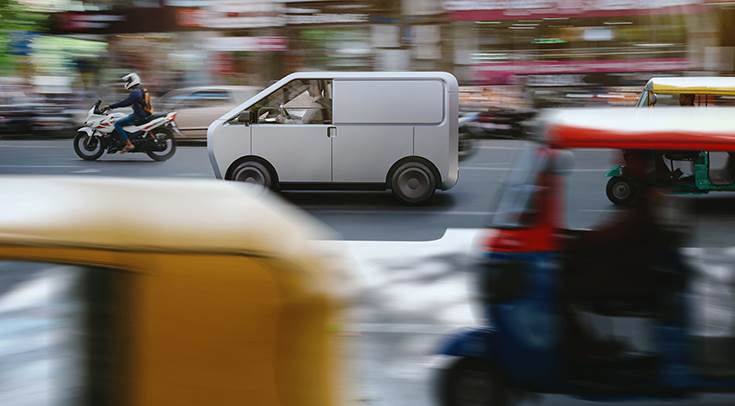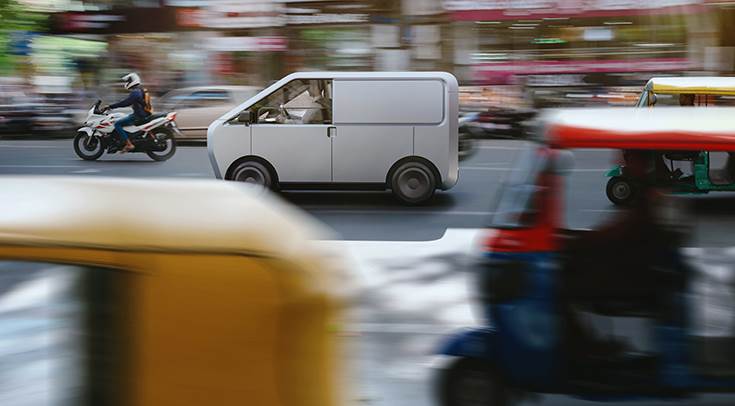British start-up Helixx has announced plans to produce a line-up of four quadricycles aimed at developing nations in Asia, produced using an innovative process inspired by McDonald’s.
The electric quartet are all based on the same underpinnings, engineered to L7e regulations – so legally limited to 20bhp and a maximum kerb weight of 450kg (rising to 600kg for cargo vehicles).
There are two commercial variants: a van with 2100 litres of cargo space and a pick-up with a 1.64m2 bed. The two passenger models, a minivan and an open-sided tuk-tuk, offer a top speed of 50mph / 80kph and a range of 70 miles / 112 kilometres.
All feature swappable 2kWh lithium-iron-phosphate (LFP) battery packs. Multiple packs can be installed to give a total capacity of 4kWh, 8kWh or 12kWh, with the highest giving a 200km (124-mile) range. And Helixx CEO Steve Pegg has confirmed to Autocar UK that the company is evaluating whether the vehicles can support an eighth pack, which would boost the range further.
 All four Helixx all-electric commercial vehicles use rapid battery swap technology to optimise operational time and profitability.
All four Helixx all-electric commercial vehicles use rapid battery swap technology to optimise operational time and profitability.
None of the vehicles will be sold directly to consumers, said Pegg, but rather leased to fleets and business operators on a subscription basis. The company aims for this subscription to be charged at just $0.25 (Rs 20) per hour of use.
To ensure profitability, the Oxford-based company will oversee small regional factories operated under licensed partnerships, in the same way that a business might opt to become a fast-food franchise.
“You can go anywhere in the world and build 95% of all the components in the local region,” explained Pegg. “If there’s a press shop, a foundry, you can make anything.”
Some components – namely the batteries – have to be sourced by Helixx, given the difficulty of their production. Nonetheless, the emphasis is on making use of local resources to reduce the vehicles’ costs (both financial and environmental).
Pegg added: “We got our inspiration from McDonald’s franchises. You don’t have to know how to cook to own McDonald’s franchise. You don’t even have to cook. All you do is follow a set of processes. You don’t need to know where your supply chain comes from.”
To ensure consistency in the quality of the vehicles potentially built all over the world, Helixx plans to use a software framework that it’s developing with technology giant Siemens. This utilises a ‘digital twin’ – a virtual model of the vehicle – with cameras, sensors and special processes on the factory floor to ensure that each step has been completed correctly.
“We can do all of that here through the UK mission control,” explained Pegg. “If we’ve got a network of factories and one has an error, we can then look at those and what’s happening as if it’s in the room next door.”
This means factory staff don’t need to be trained extensively in how to produce the Helixx vans, they “just follow a set of processes, they click a red thumbs-down button or a green thumbs-up button, and the process continues from that”.
By leasing its vehicles to fleets through a subscription model, Helixx can also take full control of what happens to a vehicle at the end of its life.
Pegg said: “There’s a lot of talk about circularity and ‘end of life’ and ‘second life’ in a lot of products, not just automotive. But the fundamental problem with that is as soon as you sell it to somebody, the problem isn’t yours any longer and you’re kind of hoping that the consumer is going to be responsible enough to [recycle].
